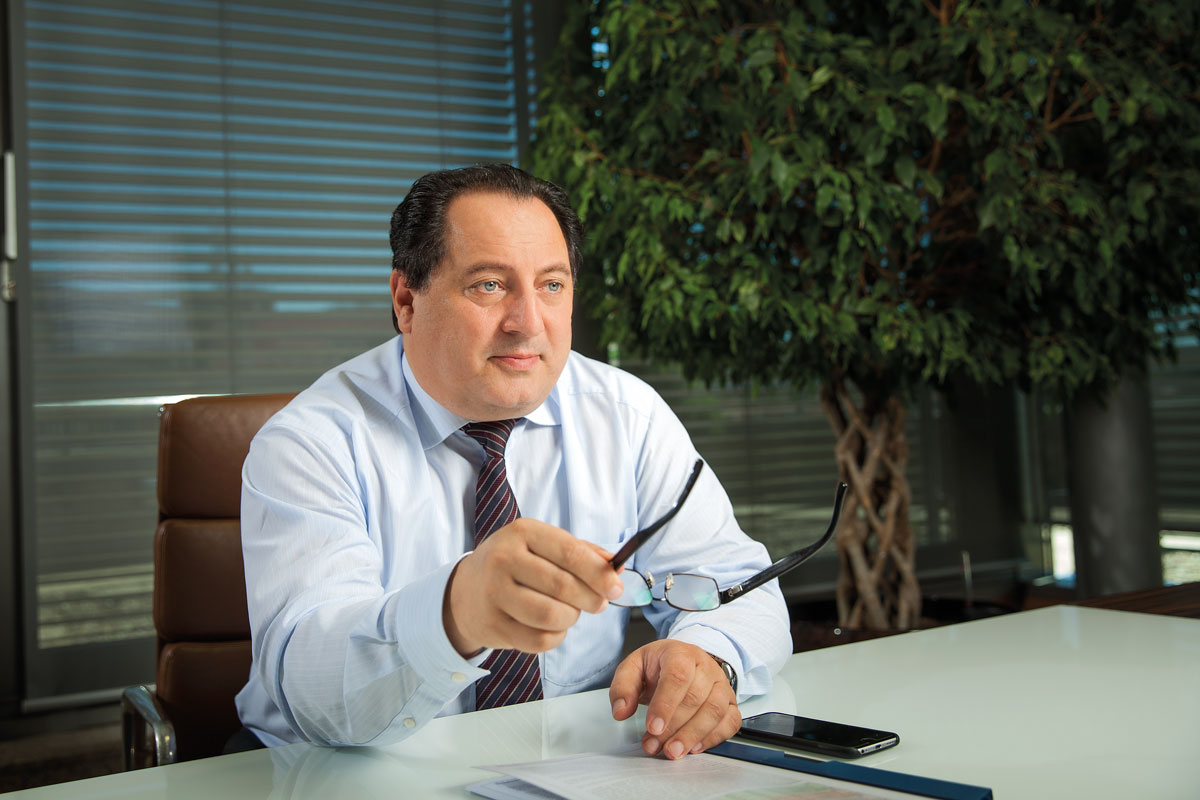Virgil Metea: Romgaz’s impact on the regional markets energy security
In the agitated context of the European energy market reconfiguration and the low natural gas prices, we talked with Mr. Virgil Metea, Director General of Romgaz, about the major challenges, the investment plans and the main directions contributing to the sustainable development of the company.
Mr. Director, as head of the largest producer and main supplier of natural gas in Romania, with a history of over a century, how would you assess the current situation of the national and regional market? Which are the current and future most significant challenges for Romgaz?
Virgil Metea: In recent years a change in the landscape of the EU energy market in general is noticed, the concerns about energy security in supplying the natural gas, the lowering of dependency on import and the mobilization for lasting sustainable energy require undoubtedly a reconfiguration/rearrangement of the natural gas market and of energy in general.
The major challenge we face is related to the current circumstances, of falling international natural gas prices, which make the producer Romgaz to face an imbalanced competition with the imported gas, at least for now.
Romgaz continuously levels the natural gas production to the needs and market requirements, where the lack of infrastructure interconnection to European markets, on one hand, and not only, allows the export of natural gas only in very small quantities and, on the other hand, domestic gas is overtaxed and it has a price reference which restricts negotiation in competitive market conditions. But the challenges are related also to the instability and unpredictability of the tax framework and fiscal regime, to the volatility of natural gas prices which may negatively affect the projection of long-term investments or to the increasing complexity and size of future investment projects.
In the ongoing reconfiguration process of the European energy market, but also under the pressure coming from the low prices, how is Romgaz related to the EU strategy?
Virgil Metea: Currently, the natural gas market in Romania is ongoing a development process, through the concern for defining the national energy strategy in line with the EU energy policies, aimed at security of supply, at legislative stability and predictability, at protecting the final and the vulnerable consumers and at sustainable development.
From the perspective of EU objectives regarding the energy markets, the role of companies in this field and their responsibility for supply will certainly be improved. What is important for the competent authorities is to ensure a transparent and efficient regional coordination so as to guarantee equal conditions for the participants to a real competitive market, fair supervision of the competition on the market is also required.
Romgaz can thus become an important factor in achieving the goal of energy security on regional markets. In recent years we have focused our investment efforts, by following an effective programme to increase the resources and gas reserves portfolio, to optimize and develop the underground storage operations both for increasing the storage capacities and for increasing the quality of storage services offered both by refurbishments and by commissioning new capacities equipped with international-standard technologies, without being limited to these. Regarding energy efficiency, we aim at improving our own operations and we support the consumers who, responsibly, opt for technologies that lead to increased efficiency and reduced CO2 emissions. The company will continue to place the principles of sustainable development at the heart of our operations.
The issues of taxes (60% overcharge on additional revenues from liberalization), of falling sales, of the absence of a tax framework to stimulate investments are joined by the European Commission investigation on the gas market in Romania. How do you comment and what impact do you anticipate this action will have on the activity of Romgaz?
Virgil Metea: Romgaz has complied with the legal provisions on inspections conducted by the European Commission Directorate General for Competition (DG Competition) of the European Commission under Article 20 (4) of (EC) Regulation No. 1/2003.
We can say that, in this regard, we have fully and actively cooperated with the DG Competition inspectors. The company has been and will be transparent and will further cooperate with the European authority to resolve all the issues covered by the DG Competition survey within the legal framework. Anyway, as any other important company and given the importance and potential impact of the case, we have contracted the services of a specialized law firm, having expertise in the field, to assist us and to represent our interests in this interaction because, if there is any suspicion, we hope to eliminate it, and we are confident there will be no problems.
In this agitated context, Romgaz has announced a new major hydrocarbon discovery in the Muntenia North-Eastern block, thus confirming the importance of the 3D seismic surveys on the rehabilitation of natural gas mature fields in order to keep up the production levels. What prospects does this new discovery give to future developments in regard to obtaining and exploiting additional geological resources?
Virgil Metea: Like I said, in recent years we have focused our investment efforts by following an efficient programme focused on maintaining the production levels, both by finding new reserves and by improving the current recovery rate through the rehabilitation of the depleted fields and also through the development and modernisation of the existing facilities and by exploring new blocks in order to discover new resources and reserves.
Surface exploration works rely mainly on 2D and 3D seismic surveys able to highlight with higher precision the possible accumulations of hydrocarbons within the explored blocks, increasing the efficiency of drilling and the prospects to achieve important discoveries.
Which are the most important onshore projects currently undertaken by Romgaz?
Virgil Metea: The onshore exploration operations Romgaz is conducting in Romania are currently being carried out under the Addendum to the Concession Agreement 23/2000 approved by the Government Decision H. G. 968/2011 to extend the exploration period of five years 2011-2016.
The main objectives of the activities have been and still are the exploration, within the leased blocks, of the areas of interest at depths of 3,000-5,500 meters, with important potential accumulations of hydrocarbons as derived from the geological and complex geophysical information, mainly from the 3D seismic data which already cover much of the high perspective areas.
The works are focused on Major Exploration Projects in the Transylvanian Basin, Northern Moldavia – Frasin, Southern Moldavia – the Roman area and Muntenia – Snagov, Caragele and Phoenix.
So far, important results have been registered, presented through press releases that mentioned the new discoveries as Cris Transylvania, Frasin in Moldavia, Rosetti and Damianca of the Phoenix project in Muntenia.
Following these results, Romgaz has initiated the necessary steps to the National Agency for Mineral Resources (NAMR) for the approval of the extension of the exploration period in order to evaluate the newly achieved discoveries and the exploration of a number of new prospections highlighted by the geological and geophysical data.
Not all exploration projects lead to favourable results. Early this year you gave up the oil operations in the Black Sea, the Rapsodia block, but you still focus on the Trident block. What can you tell us about the current state of the analysis, interpretation and evaluation of the discoveries announced in 2015?
Virgil Metea: Romgaz is associated in a farm-out contract as non-operator, with the companies Lukoil Overseas Atash B.V. and Panatlantic, with a share of 10% in the blocks EDE EX 29 Rapsodia and EX30 Trident, the offshore deep-water block in the Black Sea.
Subsequent to the initial exploration, the commitments made to the NAMR were met. The results regarding the EX 29 East Rapsodia have not confirmed the presence of hydrocarbon accumulations, which led to the decision to abandon the concession.
An accumulation of gas of about 30 Bcm has been highlighted, declared as discovery in the EX 30 Trident block. Currently, we are in exploration phase II that aims to complement the previously obtained data with additional investigation and interpretation methods to assess the discovery. This stage is usually very laborious and substantiates the future exploration programme through exploration and assessment wells, and for evidencing new prospects within the block.
Which are the milestones of Romgaz’s investment programme in 2016 and for the next period?
Virgil Metea: The investment programme is outlined on the basis of current market conditions, which require a careful analysis of the strategy to adopt. The company is targeting to turn into account the strengths and the areas with growth potential, avoiding vulnerabilities, on the basis of well documented, flexible and transparent risk evaluations. The main priorities will continue to be the increasing of resources and gas reserves portfolio, the optimization and development of the underground storage, the consolidation of its position on the energy supply markets, and the identification of new business opportunities in order to improve the company’s performances.
Exploration by using efficient technologies, with minimum environmental impact, for example, is one of the directions that contribute to the company’s sustainable development. The results of the investment programme in recent years and the exploration strategy have achieved the objectives, which create very good prospects for continuing the exploration programmes in Romania.
The government has decided, upon the ANRE request to amend the current legislative provisions, the freezing of the liberalization schedule. What is Romgaz’s point of view on this issue and what arguments do you have in this regard?
Virgil Metea: For Romania it is appropriate and necessary to meet the functional and legal conditions related to the free market, to ensure the technical interconnection to the regional market, coupled with a long term functional energy strategy, with an appropriate legislation, with predictable taxation allowing genuine and fair competition and a thorough analysis of risks and vulnerabilities.
Romgaz has repeatedly proven it has a good ability to adapt, and on a continuously changing market it allocates considerable resources for investments in exploration, production and storage, which are important for the company’s development. By its geographical position, Romania can be an important factor in energy security for the regional markets.
The Report of the Oil and Gas working session, developed by the Ministry of Energy and currently under debate, proposes the rethinking of the role played by the underground gas storage facilities and the establishment of a central authority for storage. What is your opinion about these initiatives?
Virgil Metea: The role played by the underground storage is a particularly important one for the national energy security, because the stored gas can cover the peak demand required by the market, caused for example by temperature variations, and can preserve the optimum functioning characteristics of the national natural gas transportation system.
Our projects to increase the capacity of the storage facilities have been determined also by the strategic role they can play in the future on the regional market. Romgaz is directly interested in the development of interconnection projects at European level, with obvious business opportunities. Given the portfolio of activities and its infrastructure, Romgaz can become an important and active regional player on the energy market.
According to the “Consolidated report of the working sessions within the consultative process in the stage of the qualitative analysis regarding the Romanian energy sector,” the establishment of a Central Authority for Storage is the subject of an opportunity study and the draft amendment of the normative act on setting up and maintaining a minimum level of crude oil and/or petroleum products stocks in order to ensure the security of supply in the approval circuit.
Regarding the opportunity of establishing the Central Authority for Storage, clarification is necessary in terms of regulatory and operational issues, in order to debate on its usefulness and effectiveness.
The Gas Industry Workers Day is approaching. Do you have some personal thoughts and impressions to address your colleagues in the industry…?
Virgil Metea: The methane gas industry is an industry having a tradition of over 100 years in Romania and is an important and strategic sector of the national economy, in which competence and professional conscience have played and currently play an important role, as openness to the new and to learning are always needed in order to develop new technologies and to increase the quality of products and services in this sector.
Over the years, Romgaz has undergone a comprehensive refurbishment and streamlining process, which would not have been achieved successfully without the real contribution of each employee, the human resource being one of the most important resources Romgaz has. In this way I congratulate and thank them for their loyalty and dedication to the profession they have chosen.
On the Gas Industry Workers Day, I wish all employees and collaborators involved in this field of activity all my Best Wishes!







